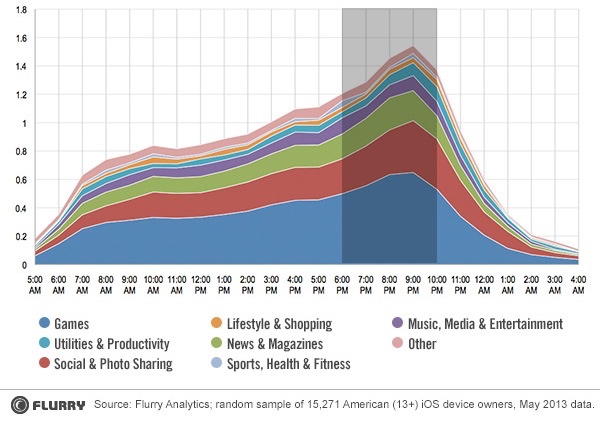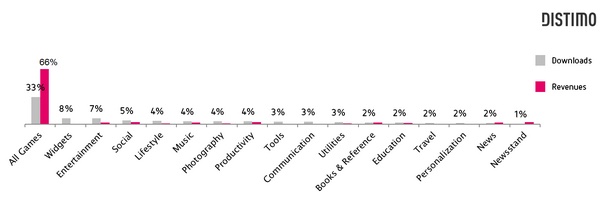The crash of gaming
“Everyone is making a mobile game.”
“VCs are not funding gaming companies any more.”
“It is a hits-driven business.”
Reading the tech media headlines these days, one would think that the mobile games industry is about to collapse. Yet, there are no signs of any impending doom. Mobile app revenue is sky rocketing, fueled largely by mobile games. We, as a post-industrial society, need more entertainment than ever and have the time for it.

Average time spent on iPhone (US) (source)

Two-thirds of mobile app revenue is from games (source)
But the gaming industry has crashed earlier. Between 1983-1985, console games revenue fell 97% (see Wikipedia). That is huge. What happened?
-
Firstly, a flooded market. Too many consoles available, with their own set of games. Everyone could and wanted to create their own game, even a breakfast cereal company! And that led to a large number of poor quality games in the stores. Sound familiar? The end consumer had to go through a lot of obstacles to find a good game.
-
Secondly, and very simply, there was competition from the new PC industry.
According to Wikipedia, there were a couple of other small reasons, but these are the two main ones. The world looks similar for mobile games at the moment. There are lot of different devices and impossibly high number of game apps that continues to grow. And there is competition from consoles that seem to be coming back (Ouya, Kinect, etc.).
Here is how the mobile game world today is different from the console game world in 1983 and why mobile games won’t “crash” tomorrow:
-
There are too many devices, but they are all very similar and have almost the same set of apps across them. Most game developers are beginning to use tools like Unity and easily build the same app across platforms.
-
Cost of low quality apps is actually very low to the ecosystem. It takes less than 5 minutes to download, try and delete an app, and usually no money. There is a supporting distribution layer that gives you reviews, rankings, curation, etc. Admittedly, it could be better, but it is still much better than relying on a salesperson at a video game store with hidden incentives.
-
Newer game platforms will just mean newer channels. Creativity is beginning to finally become the decider. Everything else (access to infrastructure, marketing, international, etc.) is being commoditized.